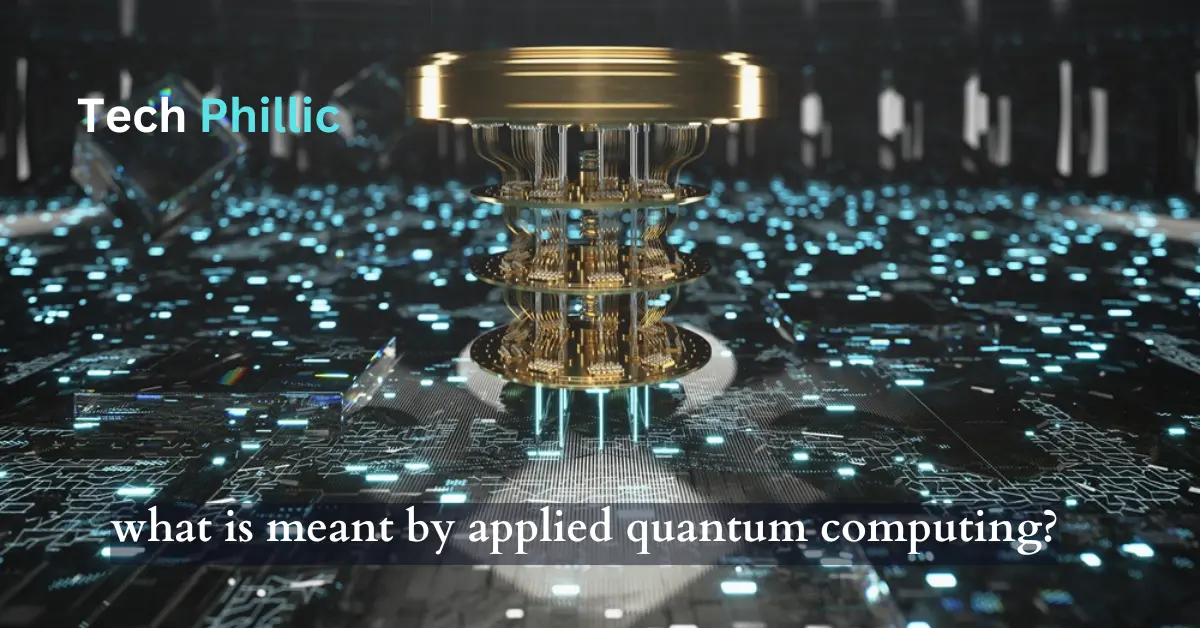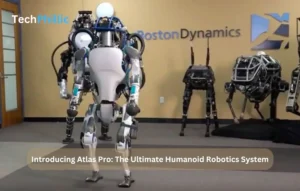Quantum Computing
Quantum computing is a type of computing that uses the principles of quantum mechanics to perform calculations. Quantum computers can solve certain problems that are intractable for classical computers, such as simulating the behavior of molecules or breaking encryption algorithms.
Applied Quantum Computing
Applied quantum computing is revolutionizing the world of technology, offering immense potential for solving complex problems that traditional computers struggle with. In this article, we will delve into the exciting realm of applied quantum computing and explore its implications for various industries.
Applied quantum computing refers to the practical application of quantum computing technology to tackle real-world challenges. Unlike classical computers that use bits to represent information as either 0 or 1, quantum computers leverage the power of qubits, which can exist in a superposition of both 0 and 1 simultaneously. This property allows quantum computers to process information exponentially faster and explore multiple solutions in parallel.
The growing interest in applied quantum computing stems from its ability to address problems that are beyond the capabilities of classical computers.
Industries such as optimization, simulation, cryptography, machine learning, drug discovery, and financial modeling can benefit significantly from the unique computational power of quantum systems.
Aims
we aim to provide a comprehensive understanding of applied quantum computing, shedding light on its principles, potential applications, and future directions.
Whether you are a technology enthusiast, a researcher, or a business leader, this article will equip you with the knowledge needed to grasp the fundamental concepts of applied quantum computing and its impact on various domains.
Understanding Quantum Computing
Here we will dive into the fascinating world of applied quantum computing, shedding light on its fundamental principles and distinguishing it from classical computing. By understanding the core concepts of quantum mechanics and the unique properties of qubits, we can appreciate the power and potential of applied quantum computing.
Overview of Classical Computing and Its Limitations
Classical computing, which forms the foundation of our current digital systems, relies on bits to store and process information. These bits can represent either a 0 or a 1, and computations are performed through logic gates manipulating these binary states. However, classical computers face limitations when tackling certain complex problems, such as prime factorization or optimization tasks, due to the exponential growth of computation time as the problem size increases.
Introduction to Quantum Mechanics and Its Fundamental Principles
Applied quantum computing operates based on the principles of quantum mechanics, a branch of physics that explains the behavior of particles at the quantum level. Unlike classical physics, where particles have well-defined properties, quantum mechanics introduces the concept of superposition and entanglement.
Explanation of Qubits and Their Superposition and Entanglement Properties
In applied quantum computing, the basic unit of information is the qubit, which can exist in a superposition of both 0 and 1 simultaneously. This property allows quantum computers to perform computations in parallel, exponentially increasing their processing capabilities. Additionally, qubits can be entangled, meaning the state of one qubit is inherently linked to the state of another, enabling instantaneous communication and correlation.
Quantum Gates and Quantum Circuits
Quantum gates are analogous to the logic gates in classical computing and are used to manipulate qubits. These gates can perform operations like flipping the qubit state, rotating it on the Bloch sphere, or creating entanglement between multiple qubits. Quantum circuits are sequences of these gates applied to specific qubits, forming the computational pathways for quantum algorithms.
Different Types of Quantum Computing Platforms
Several quantum computing platforms are being explored, each utilizing different physical systems to implement qubits. These platforms include superconducting qubits, trapped ions, and topological qubits. Superconducting qubits use electrical circuits cooled to extremely low temperatures, while trapped ions rely on manipulating ions using electromagnetic fields. Topological qubits, still in the experimental stage, exploit the properties of exotic particles to achieve robust and error-resistant qubits.
Brief Overview of Quantum Algorithms
Quantum algorithms provide a set of instructions for solving problems efficiently on quantum computers. Notable examples include Shor’s algorithm, which can factor large numbers exponentially faster than classical algorithms, and Grover’s algorithm, which speeds up searching unsorted databases. These algorithms showcase the immense computational power and potential impact of applied quantum computing in various domains.
Applied Quantum Computing in Various Fields
Quantum Computing and Cryptography
Cryptography is the science of secure communication. It relies on encryption algorithms to protect sensitive information from unauthorized access.
Quantum computers could potentially break certain commonly used encryption algorithms, such as RSA and ECC, due to their ability to solve certain mathematical problems much faster than classical computers.
Shor’s Algorithm
Shor’s algorithm is a quantum algorithm that can factor large numbers efficiently. This is a critical task in many cryptographic algorithms, such as RSA and ECC.
If Shor’s algorithm could be used on a large enough quantum computer, it would be possible to break these encryption algorithms, compromising the security of many systems that rely on them.
Post-Quantum Cryptography
Post-quantum cryptography is a field of research that seeks to develop new cryptographic techniques that are resistant to attacks by quantum computers.
Several post-quantum cryptographic algorithms are currently under development, and it is expected that these algorithms will eventually become the standard for secure communication in the post-quantum era.

Quantum Simulation and Material Science
Quantum simulation is an area where quantum computing can make a significant impact.
Quantum computers have the unique ability to simulate quantum systems.
This capability opens up exciting opportunities in various fields, including quantum chemistry, material science, and optimization.
· Quantum Chemistry Simulations
Quantum chemistry simulations are a prime example of how quantum computing can revolutionize the field of drug discovery.
Quantum computers can potentially simulate these interactions more effectively.
Quantum algorithms, such as VQE and quantum Monte Carlo methods, play a crucial role in quantum chemistry simulations.
· Material Science
Quantum computers can assist in optimizing material properties and discovering new materials.
The ability to simulate and optimize material properties using quantum computers has the potential to revolutionize industries such as electronics, energy, and manufacturing.
Quantum optimization algorithms can be employed to solve complex optimization problems in material science.
Quantum Optimization and Operations Research
Optimization is a critical task in various fields, ranging from logistics and supply chain management to resource allocation and scheduling.
Traditional optimization methods often face challenges when dealing with complex problems that involve a large number of variables and constraints.
However, applied quantum computing offers a promising avenue for solving these optimization problems more efficiently.
- Applied quantum computing algorithms, such as the Quantum Approximate Optimization Algorithm (QAOA), harness the power of quantum systems to explore and find optimal solutions.
- These algorithms leverage the unique properties of quantum computers, such as superposition and entanglement, to perform parallel computations and efficiently search through a vast solution space.
Applications of Quantum Optimization
· Quantum Optimization Algorithms
- One of the potential applications of applied quantum computing is in logistics and supply chain management.
- These fields involve complex decision-making processes, such as route optimization, inventory management, and demand forecasting.
- Applied quantum computing can significantly improve these processes by finding the best solutions to optimize supply chains, reduce transportation costs, and improve overall efficiency.
- Resource allocation is another area where applied quantum computing can make a substantial impact.
- Whether it’s allocating resources in manufacturing, energy distribution, or project scheduling, applied quantum computing can optimize the allocation of resources to maximize efficiency and minimize costs.
- By considering multiple variables and constraints simultaneously, applied quantum computing algorithms can provide better resource allocation strategies compared to classical methods.
· Quantum Annealing
- Quantum annealing is another approach to solving complex optimization problems.
- It involves using a physical system, such as the D-Wave quantum annealing system, to find low-energy states that correspond to optimal solutions.
- Quantum annealing can be applied to a wide range of optimization problems, including graph theory, network analysis, and combinatorial optimization.
- As the technology continues to advance and quantum computers become more powerful and stable, the practical implementation of applied quantum computing in real-world scenarios becomes increasingly feasible.
Machine Learning and Artificial Intelligence with Quantum Computing
Machine learning and artificial intelligence (AI) are rapidly evolving fields that have the potential to revolutionize various industries.
Quantum computing brings new possibilities to machine learning by leveraging its unique properties to enhance computational capabilities and improve the performance of AI algorithms.
· Advantages of Quantum Machine Learning
- Quantum machine learning algorithms offer several advantages over classical machine learning methods.
- Faster data analysis: Quantum computers can leverage quantum parallelism and superposition to perform computations on multiple inputs simultaneously, enabling faster data analysis and processing.
- Improved pattern recognition: Quantum computers can exploit quantum interference and entanglement to identify subtle patterns and correlations in complex datasets that may be challenging for classical algorithms to discern.
- Enhanced data processing capabilities: Quantum computers can perform more efficient data queries and searches using quantum algorithms such as the quantum database search algorithm (Grover’s algorithm).

· Applications of Quantum Machine Learning
- Quantum machine learning has the potential to revolutionize various industries, including:
- Healthcare: Quantum machine learning algorithms can help analyze large-scale genomic data and identify patterns related to disease susceptibility and drug response.
- Finance: Quantum machine learning can improve prediction models for stock market trends and optimize portfolio management strategies.
- Other industries: Quantum machine learning has the potential to be applied to a wide range of other industries, such as fraud detection, cybersecurity, and transportation.
Also Read: Shuffles Invite Codes (16 July, 2023): Get Early Access to the New Collage App
Quantum Computer Pros and Cons
Quantum Computer Pros:
- Speed: Quantum computers can perform certain calculations much faster than classical computers. This is because they can take advantage of quantum phenomena such as superposition and entanglement.
- Power: Quantum computers can be used to solve problems that are intractable for classical computers. This includes problems in cryptography, chemistry, and materials science.
- New possibilities: Quantum computers open up new possibilities for computation and problem-solving. This could lead to advances in a wide range of fields, such as healthcare, finance, and artificial intelligence.
Quantum Computer Cons:
- Complexity: Quantum computers are incredibly complex devices. This makes them difficult to build and maintain.
- Error-prone: Quantum computers are also error-prone. This is because quantum phenomena are inherently probabilistic.
- Not yet practical: Quantum computers are not yet practical for most applications. This is because they are still too small and noisy.
Here are some additional points to consider:
- Security: Quantum computers could be used to break current encryption algorithms, which could have a major impact on cybersecurity.
- Ethics: The development of quantum computers raises several ethical concerns, such as the potential for misuse of the technology.
- The future: It is still too early to say what the future holds for quantum computers. However, the potential benefits of this technology are immense, and it is likely to have a major impact on society in the years to come.
Challenges and Future Directions
Quantum computing is a promising field that has the potential to revolutionize various industries by solving complex problems more efficiently than classical computers.
However, several challenges need to be addressed to fully realize the potential of quantum computing.
Scaling Quantum Computers and Reducing Error Rates
- Scaling quantum computers and reducing error rates are crucial challenges that need to be overcome for practical applications of quantum computing.
- Currently, quantum computers are limited in terms of the number of qubits they can reliably control and the duration of coherent quantum states.
- The delicate nature of qubits makes them susceptible to noise and decoherence, leading to errors in calculations.
- As the number of qubits increases, so does the complexity of maintaining their coherence and minimizing errors.
Quantum Error Correction
- Quantum error correction is a technique aimed at addressing the issue of errors in quantum computations.
- It involves encoding quantum information redundantly across multiple qubits, allowing for error detection and correction.
- By detecting and correcting errors, quantum error correction can significantly improve the reliability and stability of quantum computations.
- However, implementing quantum error correction is challenging due to the need for additional qubits and complex error correction protocols.
The Concept of Quantum Supremacy
- The concept of quantum supremacy refers to the point at which a quantum computer can perform calculations that are infeasible for classical computers to solve within a reasonable time frame.
- Achieving quantum supremacy signifies a significant milestone in the field of quantum computing, demonstrating the potential computational power of quantum systems.
- It validates the superiority of quantum computers for certain tasks and opens up new possibilities for solving complex problems efficiently.
Future Directions in Quantum Computing
Looking toward the future, there are several potential developments and advancements in quantum computing on the horizon. One area of research is focused on developing more stable and scalable qubits.
Scientists and engineers are exploring different qubit technologies, such as superconducting qubits, trapped ion qubits, topological qubits, and more. Advancements in qubit technologies could lead to more robust and reliable quantum computers.
Another area of research is quantum algorithms and applications. As the field of quantum computing matures, more sophisticated quantum algorithms can be developed to solve specific problems efficiently.
Quantum algorithms can be tailored to optimize tasks such as optimization, simulation, machine learning, and cryptography. Ongoing research in quantum algorithms holds the promise of unlocking new capabilities and expanding the range of problems that can be addressed using quantum computers.
Furthermore, improving the error rates and implementing fault-tolerant quantum computing is a significant goal. Fault-tolerant quantum computing aims to design quantum systems that can withstand and correct errors without sacrificing computational power.
By developing fault-tolerant quantum systems, researchers can build more reliable and practical quantum computers capable of performing complex calculations accurately.
Conclusion
Quantum computing is still in its early stages, and many of these future developments require substantial advancements in technology, hardware, and algorithms. Overcoming technical challenges, improving qubit stability, and refining error correction methods are ongoing research efforts. Additionally, collaborations between academia, industry, and government institutions play a crucial role in driving progress and fostering innovation in the field of applied quantum computing.
Scaling quantum computers, reducing error rates, implementing quantum error correction, and achieving quantum supremacy are key challenges in the field of applied quantum computing. Despite these challenges, there is a promising future for applied quantum computing with potential developments in qubit technologies, quantum algorithms, fault-tolerant applied quantum computing, and advancements driven by collaborative research efforts.
As the field continues to evolve, applied quantum computing has the potential to revolutionize various industries and tackle complex problems that are beyond the capabilities of classical computers. For example, applied quantum computing could be used to develop new drugs and materials, design more efficient power grids, and improve financial trading algorithms.
The use of applied quantum computing is still in its early stages, but the potential benefits are vast. As the technology continues to develop, we can expect to see even more exciting applications in the future
The future of applied quantum computing is bright, and there is a lot of potential for this technology to revolutionize the way we live and work.
FAQs
-
What are the practical applications of quantum computing?
Quantum computing has the potential to revolutionize many industries, including finance, healthcare, and materials science. Some of the practical applications of quantum computing include:
Cryptography: Quantum computers could be used to break current encryption algorithms, which could have a major impact on cybersecurity.
Simulation: Quantum computers can be used to simulate complex systems that are difficult or impossible to simulate on classical computers. This could be used for applications in chemistry, materials science, and drug discovery.
Optimization: Quantum computers can be used to solve optimization problems that are intractable for classical computers. This could be used for applications in logistics, finance, and scheduling.
Machine learning and AI: Quantum computing could be used to develop new machine learning and AI algorithms that are more powerful and efficient than current algorithms. -
How does quantum computing differ from classical computing?
Classical computing uses bits, which can be 0 or 1.
Quantum computing uses qubits, which can be 0, 1, or both at the same time.
This gives quantum computers an exponential advantage over classical computers for certain types of problems. -
Can quantum computers break encryption?
It is possible that quantum computers could break current encryption algorithms.
This is because quantum computers can perform certain calculations that are impossible for classical computers.
However, new encryption algorithms are being developed that are resistant to quantum computers. -
What are the limitations of current quantum computers?
Current quantum computers are still in their early stages of development.
They are prone to errors, and they are difficult to scale to large numbers of qubits.
They are also very expensive to build and operate. -
How can quantum computing benefit machine learning and AI?
Quantum computing could be used to develop new machine learning and AI algorithms that are more powerful and efficient than current algorithms.
This could lead to advances in a wide range of fields, such as healthcare, finance, and materials science. -
Are there any real-world examples of quantum computing applications?
Google has developed a quantum computer that can be used to simulate molecules.
This could be used to develop new drugs and materials.
D-Wave Systems has developed a quantum computer that can be used to solve optimization problems.
This could be used for applications in logistics and finance.







